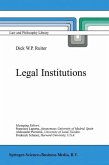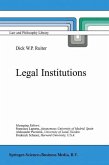Over the last few decades, the notion of rationality has come to dominate the social sciences. This book stresses that the all too narrow economic conception of rationality should be complemented by a number of alternatives. All this has both theoretical and normative implications. Whereas economists typically defend a central role for markets, alternative conceptions of rationality create more room for legitimate government interventions and informal communities. This book argues that any search for a desirable institutional structure should be based on empirically adequate models of people. Based on the optimistic belief that people are both able and willing to improve the rules and institutions that govern their lives, it should be of interest to anyone working within the field of political philosophy.
Bitte wählen Sie Ihr Anliegen aus.
Rechnungen
Retourenschein anfordern
Bestellstatus
Storno








